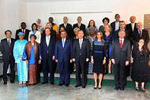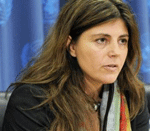Published on Tue, 2013-05-14 00:00
A group of Southern NGOs, led by DAWN, ANND and Social Watch, is gathering signatures in order to send this letter in the coming days to the members of the High Level Panel that is advising the UN on the content of a future Agenda for Development post-2015. To add your signature to the letter please write to socwatch@socialwatch.org. |
Published on Mon, 2013-05-13 12:16
Here is the map of the complicated road towards a development agenda post 2015. Check out this visual from The Broker that shows which actors play a role in the Post-2015 process and provides links for further information. |
Published on Tue, 2013-05-07 12:55
In a highly publicized speech, World Bank President Jim Yong Kim announced in April that the new "highly ambitious" target of his institution will be "ending extreme poverty in the world by 2030." He said that developing countries have “a chance -- for the first time ever -- to end extreme poverty within a generation." Yet, that same goal was set 40 years ago by then World Bank president Robert McNamara and the target date was the year 2000. What's the excuse for a delay of 30 years? |
Published on Tue, 2013-05-07 12:55
Interview with Magdalena Sepúlveda, Special UN Rapporteur for Human Rights and Extreme Poverty What are the Guiding Principles on Extreme Poverty and Human Rights? They are a set of human rights norms recently adopted by the UN Human Rights Council. They provide, for the first time, global policy guidelines validating specific obligations incumbent on States with respect to persons living in extreme poverty. |
Published on Thu, 2013-05-02 10:55
Unlike many developing countries, India’s economy has been growing at a fast pace, enabling the government to mobilize the necessary resources internally for the achievement of the Millennium Development Goals (MDGs) by 2015. Its dependence on international aid, especially for financial resources is minimal; in fact it has declined bilateral aid from many countries. Despite this, however, the country has failed to achieve most of the goals and targets. The main reasons for this are inadequate funding, inappropriate administration and ignorance of policy and governance issues. Ultimately however, the failure is due to the absence of inclusiveness in the development model. Instead of enabling people to acquire basic needs such as food, sanitation, water, health care, the government is promoting ‘non-inclusive growth’ and has sought to provide basic services through subsidies with the associated problems of inefficiency and corruption. |
SUSCRIBE TO OUR NEWSLETTER







